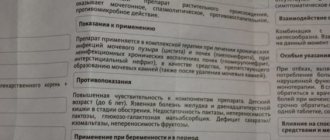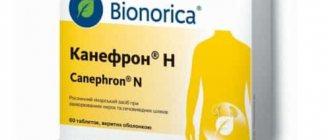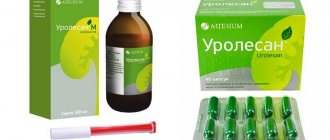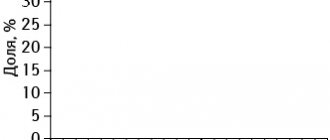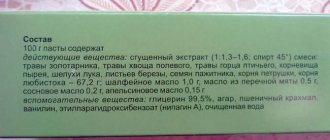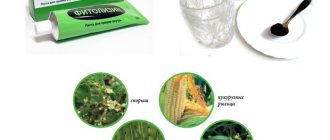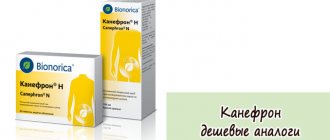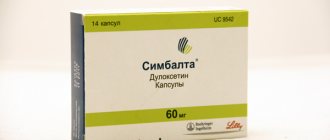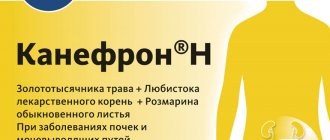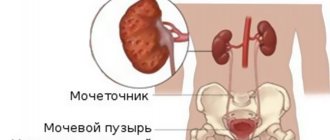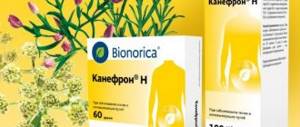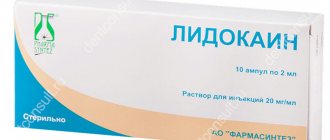Many people have problems with the genitourinary system. The pharmaceutical industry around the world produces a huge number of drugs to get rid of these diseases.
Among the most well-known medicines are “Fitolysin” and “Canephron”. Let's look at each of these drugs in more detail.
- Dosage form and composition
- Indications for use
- Contraindications for use and side effects
- Instructions for use
Features of the drugs
Canephron and Fitalizin are natural medicines intended for the treatment of infectious and inflammatory pathologies of the bladder, urethra and kidneys.
They have similar therapeutic effects, namely:
- Slows down the growth and development of bacteria.
- Increase urine output.
- Helps reduce swelling.
- Relieves spasms and eliminates pain.
- Removes toxins from the body and enhances the ability to regenerate.
In addition, Phytolysin successfully removes stone deposits and sand of non-phosphate origin and prevents their occurrence. The second drug has the same property, but without restrictions.
And Canephron has an antibacterial effect, which makes it possible not to use additional antibiotics when treating chronic urinary system diseases with this drug. The drug has a pronounced therapeutic effect, but the symptoms do not decrease immediately, since Canephron first accumulates in the body.
Phytolysin, Urolesan, Cyston or Canephron: which is better?
There are a huge number of medications designed to treat the urinary system. Many patients want to know which one is better?
This question cannot be answered unequivocally. Some patients are more suitable for “soft” medications, which have a minimum number of side effects and at the same time have a mild therapeutic effect.
Others need to use powerful medications that effectively eliminate even the most advanced forms of the disease, but, unfortunately, have a number of unpleasant side effects.
Some patients prefer to use medications with herbal components, while for other patients they are completely contraindicated due to the risk of allergic reactions.
Thus, we can conclude that only a qualified doctor can choose the most suitable drug and only after conducting a series of studies. In this case, the individual characteristics of the patient’s body and the degree of neglect of the disease must be taken into account.
Release forms, manufacturer of each medicine
Phytolysin is produced by Polish manufacturers in the form of a thick green paste with a pronounced grassy smell and a unique taste.
The German drug Canephron is presented in two forms:
Orange colored oblong tablets (dragées). This form is suitable for adults and children over 6 years of age.
Liquid form in the form of yellowish drops with the smell of grass. Contains an alcohol component. It is recommended for use by children from the first days of life and by adults who do not suffer from a craving for alcoholic beverages. Precipitation may form in the product, so shake the bottle before use.
Therapeutic effect of Cyston
Due to the fact that the medicinal composition includes herbal infusions and natural ingredients, Cyston demonstrates the following actions:
- antispasmodic;
- antiseptic;
- diuretics;
- anti-inflammatory;
- antimicrobial;
- nephrolitholytic.
All of the above actions occur thanks to Cyston. The drug reduces the totality of components in the urine that provoke the formation of stones in the system. Removes salts from the urinary tract and small stones. Increases the density of constituent elements in urine, thereby slowing down the process of stone formation. The drug protects the system from the accumulation of crystals that usually form around the stone, preventing it from increasing in size.
Cystone reduces the likelihood of creating a stone surface, making it possible to dissolve or crush it. The muscles of the urinary canals are made free, and the risk of spasms is reduced. The manifestation of all positive actions contributes to normal urine output.
All effects, both pharmacological and therapeutic, do not affect the level of acid in urine. Therefore, the medicine can be taken without taking into account the properties of urine.
Composition of Canephron and Phytolysin - what is the difference?
Phytolysin and Canephron are preparations containing natural ingredients of plant origin. In Canephron it is:
- Lovage and rosemary extract.
- Centaury and rosehip extract.
- Additionally, the composition includes:
- Corn and castor oil.
- Lactose and sucrose.
- Silicon dioxide, iron oxide, titanium dioxide.
- The liquid form of the drug contains an alcohol component.
Attention! Canephron should be taken with caution by people allergic to corn.
The composition of Phytolysin pleases with the following ingredients:
- Parsley and onion peels.
- Birch leaves and horsetail.
- Knotweed and knotweed.
- Goldenrod and fenugreek.
- Lovage rhizome.
- Wheatgrass and essential oils.
Canephron and Phytolysin contain lovage extract, which helps remove stones and sand from the bladder and kidneys.
Difference in Action
Medicinal plants with a diuretic effect form the basis of both drugs. The fact is that one of the principles of preventing urolithiasis is stimulating urine production, preventing its concentration and precipitation in the form of salt crystals.
Diet and individual characteristics can affect the reaction of urine. When urine is acidic, stones form in it, 80% of which is calcium oxalate (read in detail how to reduce the acidity of urine at the link below). Therefore, the main therapeutic strategy is to dilute the urine and increase its flow. For example, it is estimated that when urinating about 2 liters per day, new oxalate stones do not form. Diuretic plants, known to mankind for a long time, can successfully help with this. They are the ones contained in the described preparations.
As a rule, medicinal plants have not one, but many beneficial properties. This is fully applicable to the herbal components contained in the preparations. They have:
- antispasmodic,
- antimicrobial,
- fungistatic
- nephroprotective,
- antitoxic,
- antioxidant,
- astringent,
- wound healing,
- normalizing water-salt metabolism effect.
The use of drugs for cystitis is possible due to the anti-inflammatory effect exhibited by rosemary and birch leaves, horsetail, centaury, knotweed, goldenrod, and fenugreek.
Separately, it is necessary to say about the ability of the extract from wheatgrass rhizomes to influence the size and number of stones formed during urolithiasis. A randomized clinical trial found that when such an extract was used as an additional therapeutic agent, the size of stones decreased by 3.6 mm, and their number also decreased.
Indications
Phytolysin and Canephron are used in the treatment of diseases such as:
- Nephritis
- Pyelonephritis is chronic and acute.
- Cystitis
- Nephrolithiasis
- Formation of stones in the bladder.
Canephron is also used to treat glomerulonephritis, and for Phytolysin this disease is a contraindication. In addition, this medicine removes any stone formations, and Phytolysin cannot be used in the presence of phosphate stones. Chronic diseases outside the period of exacerbation do not require additional antibacterial drugs when treated with Canephron, but this remedy acts more slowly than Fitolysin.
For reference! After a course of treatment with Phytolysin, hair follicles are strengthened and hair fragility is reduced.
Drug analysis and instructions
Phytolysin is classified as a medicine of natural origin with a minimum number of contraindications and side effects.
The medicine is used as part of combination therapy; it significantly enhances antibacterial treatment. For this reason, it is often prescribed in combination with antibiotics.
What effect does Phytolysin paste have on the human body:
- stops inflammation and prevents the proliferation of bacteria;
- has a mild diuretic effect, improves urine flow;
- stimulates kidney function, normalizes their filtration function;
- promotes the breakdown of stones and the removal of sand naturally.
The drug is suitable for long-term use; it is often prescribed in the presence of chronic diseases of a urological and nephrological nature.
If you believe the instructions, then the medicine should be used:
- for several months;
- first dissolving the paste in water.
The drink is taken several times a day, up to 3 times. This allows you to normalize the functioning of the kidneys and the entire urinary system.
If necessary, the drug is prescribed to pregnant women, elderly patients and children - these patients are at risk. However, the use of medications with other characteristics may be prohibited for these individuals.
Since Phytolysin is considered a herbal drug, it does not have many contraindications and side effects, and this guarantees the safety of therapy and its easy tolerability.
The drug has several forms of release, sold in the form:
- pastes (has a specific smell and taste);
- soft capsules (for pregnant women, the drug is marked Perenatal).
The medication has no other forms of release, is prescribed by urologists and nephrologists, is well tolerated and is suitable for long-term therapy lasting 6 months.
Indications for use
There are a number of diseases that can act as indications for the use of the paste, these are various diseases of inflammatory and other origins that occur with impaired kidney function.
The list of possible indications may include:
- cystitis or inflammation in the walls and organs of the bladder;
- pyelitis, an inflammatory or infectious process that affects the kidney capsule;
- pyelonephritis, inflammatory process in the kidneys;
- urethritis or infection of the urethra by pathogenic bacteria;
- glomerulonephritis (only as prescribed by a doctor and as part of combination therapy);
- edema syndrome in pregnant women and gestosis;
- urinary retention not due to ureteral obstruction;
- urolithiasis (the presence of sand or stones in the kidneys or other organs of the urinary system).
Any inflammatory or infectious disease, impaired urine flow, or the appearance of edema can serve as an indication for the use of the paste.
But it is advisable to agree on the decision to use the drug with a doctor, otherwise the risk of ineffective therapy and the appearance of unwanted complications increases.
https://youtube.com/watch?v=iiJgDg3jYgs
Contraindications and possible side effects of each
Canephron should not be taken in the following cases:
- Pathologies of the gastrointestinal tract during exacerbation.
- Disruption of brain activity.
- The use of the liquid form of the drug by persons prone to alcoholism is prohibited.
- Children under 6 years of age should not take the drug in pill form.
- Head injuries.
- Hypersensitivity to the constituent components.
Sometimes you may notice unpleasant side symptoms:
- Allergic rash and itching.
- Digestive disorders and attacks of nausea.
- Difficulty passing urine.
- Appearance of blood in the urine.
Such manifestations require immediate cessation of the drug and medical attention.
Phytalizin has the following contraindications:
- Acute diseases of the digestive system.
- Renal failure and nephrosis.
- Heart failure.
- Formation of stones of phosphate origin.
- Glomerulonephritis
- Susceptibility to constituent components.
- Age up to 18 years.
Side effects may appear as:
- Nausea and indigestion.
- Allergic rash.
- Glomerulonephritis and nephrosis.
- Stomach ulcer and gastritis.
- Loss of taste.
Instructions for use of Cyston (Method and dosage)
For those who take the drug Cyston, the instructions for use indicate that it should be taken orally. Treatment may depend on the size and types of stones
. The duration of the course is determined individually (from several weeks to 6 months, until the absence of stones is determined).
Instructions for use of Cyston indicate that for urinary tract infections the following dosages per dose are indicated:
- age 6-14 years – 1 tablet is given;
- age 2-6 years – half a tablet is given.
- age from 14 years – 1 tablet is given;
- age 6-14 years – half a tablet is given;
- age 2-6 years - a quarter of a tablet is given.
The medicine is taken 3 times during the day. Therapy is designed for 6-12 weeks.
Cyston for cystitis is used 2 tablets in the morning and evening until complete recovery. Typically, treatment lasts from one month to 12 weeks
. In special cases, the doctor may prescribe tablets 3 times a day. It is acceptable to use it if necessary to prevent relapses of such diseases.
- age 6-14 years – 1 tablet is given;
- age 2-6 years – half a tablet is given.
Children over 14 years of age and adults need to take 2 tablets. Take 3 times a day after meals
.
The course lasts 3-4 months
. After this, therapy is continued in the following dosages per dose:
- age from 14 years – 1 tablet is given;
- age 6-14 years – half a tablet is given;
- age 2-6 years - a quarter of a tablet is given.
The medicine is taken 2 times a day. Therapy continues until the stones are completely removed from the body.
- age 6-14 years – 1 tablet is given;
- age 2-6 years – half a tablet is given.
Children and adults are given 2 tablets. The drug should be taken 3 times a day until all symptoms go away.
To prevent urolithiasis, the medicine should be taken after meals, 2 tablets in the morning and evening. The course is designed for a month
.
Then the instructions for use of Cyston advise taking one tablet in the morning and evening for 20 weeks
.
Children aged 6 to 14 years are given half a tablet, and children aged 2 to 6 years are given a quarter of a tablet
. These dosages are for one dose. The same dosage regimen is acceptable for the purpose of prevention after surgery to remove kidney stones.
How to take, is it possible together: diagrams
Phytolysin is taken by diluting 1 tsp in 100 ml of water at room temperature. pasta. The solution should be drunk 4 times a day after meals. You can drink it with water and add honey or sugar to the solution.
The duration of treatment is determined by the doctor and varies from 2 to 8 weeks.
Canephron is taken according to the following scheme:
- Adults – three doses per day, 2 tablets or 50 drops.
- Children over 6 years of age - three doses per day, 1 tablet or 25 drops.
- Children under 6 years of age – three doses per day, 15 drops each.
- Babies up to 12 months – three doses per day, 10 drops each.
The duration of treatment is determined by the doctor.
The simultaneous use of Canephron and Phytolysin is not recommended due to the multicomponent composition and the high risk of allergic manifestations.
Analogues of Phytolysin
At the moment there is a huge selection of Phytolysin analogues. Each of them has its own advantages and disadvantages.
Canephron
Canephron is a herbal preparation that has diuretic, anti-inflammatory, antispasmodic, and antibacterial properties.
It contains lovage, centaury and rosemary.
The medicine is used in the treatment of chronic infectious processes in the bladder and kidneys, as well as inflammatory kidney damage of non-infectious origin. Canephron is often used in the postoperative period to prevent the formation of stones in the urinary system.
The drug is rarely used independently and is usually used in complex therapy.
Canephron is prescribed for adults 2 tablets three times a day, and for children over 6 years old - 1 tablet three times a day. The course of treatment is until the symptoms of the disease decrease and then for another 3-4 weeks.
If the drug is in liquid form, the dosage will be as follows:
- adults – 50 drops 3 times a day;
- children under 18 years old – 25 drops three times a day;
- children under 6 years old – 15 drops 3 times a day;
- infants – 10 drops three times a day.
Pregnant and breastfeeding women are prescribed medicine only in cases where the danger of the disease outweighs the risk of using the medicine.
Contraindications include ulcerative damage to the gastrointestinal tract (especially in the acute phase), lactose and/or sucrose intolerance, hypersensitivity to the components of the drug.
The price for Canephron in tablet form is 445 rubles, and in drops – 405 rubles.
Uronephron
Uronephron is a homeopathic remedy that is actively used to treat pathologies of the urinary system.
This medication contains:
- birch leaves;
- onion peel;
- creeping knotweed;
- parsley;
- horsetail;
- goldenrod;
- wheatgrass;
- fenugreek;
- lovage
Thanks to this rich composition, Uronefron has the following beneficial properties:
- improves urine flow;
- relieves inflammation;
- has an antibacterial effect;
- stimulates the flow of bile;
- has a litholytic effect;
- promotes regeneration of damaged tissues;
- removes toxins;
- strengthens the body's defenses.
The drug is available in tablet form, as well as in the form of gel and drops.
Among the indications in this case are the following:
- inflammation of the urethra and/or bladder;
- the presence of stones in the urinary system;
- inflammatory kidney damage;
- prostatitis.
In addition, the medication can be prescribed to prevent urolithiasis.
Uronephron in the form of syrup is recommended to be taken 5 ml 3-4 times a day. If desired, you can drink it with water.
The medicine in the form of drops should be taken 25-30 drops three times a day. Before use, the drops should be diluted in water.
If the patient purchased the drug in gel form, then it should be taken 1 tsp. 3-4 times a day.
The course of therapy usually lasts 2-6 weeks, but after some time it may have to be repeated.
Contraindications in this case include:
- allergy to the components of the product;
- severe damage to the glomeruli;
- advanced kidney inflammation;
- phosphate lithiasis;
- narrowing of the urethra;
- nephrosis;
- thrombosis;
- pregnancy and lactation;
- age under 15 years.
The price for Uronefron in the form of drops is 100 rubles, gel – 140 rubles, syrup – 110 rubles.
Blémarin
Blemaren is a medicine that comes in the form of effervescent tablets. It contains citric acid, sodium citrate, and potassium bicarbonate.
The main property of this product is to dissolve salts. For this reason, the drug is usually prescribed to patients who have stones in the urinary system or have increased salt content in the urine.
Contraindications include:
- renal failure;
- the presence of infections in the urinary system;
- urine pH value is more than 7;
- low salt intake;
- allergy to the components of the medicine.
Blemaren is not recommended for use in pregnant and breastfeeding patients.
Before taking the medicine, it must be diluted in a glass of liquid. The optimal dosage is 2-6 tablets per day.
The price of the drug today is approximately 1180 rubles.
Phytolit
Phytolit is another drug that contains plant components. These are, first of all, knotweed, St. John's wort and horsetail. The drug also contains auxiliary components.
This medication is prescribed to patients who have kidney or bladder stones, as well as inflammatory processes in this area.
The product is not recommended for use in cases of hypersensitivity to the components of the drug, during pregnancy and lactation, as well as in patients under 12 years of age.
You need to take Fitolit 2 tablets 2-3 times a day. The course of therapy is 30 days.
The price of the drug today is about 140 rubles.
Citrokas
Citrokas is a medicine that contains potassium citrate. It is available in powder form. This remedy is used for urolithiasis, as well as for conditions where the urine becomes more alkaline.
Contraindications for Citrocas include:
- hypersensitivity to the components of the drug;
- impaired renal function, renal failure;
- violation of the acidity of gastric juice;
- infections in the urinary system;
- narrowing of the urethra;
- a diet that requires abstinence from salt consumption.
Before taking the medicine, it must be dissolved in a glass of water. The recommended dose is 1-2 sachets per day. The course of therapy is 1-6 months.
Cyston
Cyston has a diuretic, antispasmodic, anti-inflammatory and antibacterial effect.
It contains:
- mumiyo;
- Ash speedwell;
- basis;
- achyranthes;
- to fill up;
- madder cordifolia;
- saxifrage;
- double-stemmed carp.
The medicine is traditionally used to treat urolithiasis, increased levels of salts in the urine, gout, and infections of the urinary system.
The drug should be taken 2 tablets twice a day. The course of treatment is individual in each case - it is determined by the attending physician.
Contraindications include hypersensitivity to the components of the drug.
The price for this product today starts from 300 rubles.
Uralit-U
Uralit-U is available in the form of granules that must be taken orally. They contain hexacalium-hexasodium-trihydrogen citrate complex.
This medicine is used in the treatment of patients who have kidney or bladder stones, gout, or suffer from porphyria.
Quite often, oncologists recommend it to patients during chemotherapy.
Contraindications in this case include:
- renal failure;
- metabolic alkalosis;
- urinary tract infections;
- a diet that consumes too little salt;
- Urine pH more than 7;
- age up to 12 years.
Particular care must be taken when using Uralit-U to treat patients with severe liver pathologies.
Uralit-U should be taken in the amount of 4 scoops per day. This portion should be divided into 3 doses.
To prevent the formation of stones, the medication is taken in a dosage of 2 scoops once, in the evening.
The price of the drug at the moment is approximately 940 rubles.
Renel
Renel is a homeopathic remedy that is used to treat patients with inflammation of the urinary system, the presence of stones in the bladder or kidneys.
As an addition to the main treatment, the drug can be used for hydronephrosis, renal colic, and prostate adenoma.
Renel includes:
- aluminum;
- berberis;
- plumbum;
- pareira brava;
- Nitricum acidum;
- cantharis.
The medicine should not be taken by children under 3 years of age, as well as by patients who have hypersensitivity to the components contained in the composition.
You need to take Ranel 1 tablet three times a day. It should be dissolved 30 minutes before meals or an hour after that.
The approximate price of Renel in pharmacies today is 340 rubles.
Rowatinex
Rowatinex is a herbal medicine that has a litholytic and diuretic effect, eliminating spasms. It contains terpenes, which are obtained from coniferous plants and essential oils.
The drug is used to treat patients who have kidney or bladder stones.
Contraindications include children under 6 years of age and hypersensitivity to the components of the product.
Rowatinex is prescribed to adults, 1-2 tablets three times a day. The dosage for children from 6 to 14 years is 2 capsules per day. They should be taken morning and evening.
The approximate price of Rowatinex is 1,450 rubles.
Features of reception for pregnant and nursing mothers
The completely natural composition of both medications allows them to be used for drug therapy of infections and inflammations in the urinary system during pregnancy and breastfeeding. Canephron and Phytolysin do not have a negative effect on pregnancy and fetal development and will not cause harm if they enter the baby’s body with milk.
It should be borne in mind that Phytolysin has a peculiar smell and taste and can enhance the signs of toxicosis. If you are hypersensitive to odors, the drug should be replaced with another one. The same should be done if there are attacks of nausea, pain in the stomach and an allergic reaction.
Comparison of drugs
On the pharmacological market there are many herbal medicines created for the treatment of diseases of the urinary system: Canephron, Cyston, Fitolysin. They have different compositions and differ in application features.
Compound
- Dragees and aqueous-alcoholic solution of Canephron H include 3 active ingredients: lovage
- centaury
- rosemary.
- lovage
Mechanism of action
Both drugs have a diuretic effect, reduce inflammation, prevent the proliferation of bacteria, and relieve spasm in the urinary tract. In addition, they help dissolve kidney stones and flush out sand and crystals from them. Canephron copes better with dissolving urate and phosphate stones, Fitolysin - oxalate and urate stones.
Indications
https://www.youtube.com/watch?v=https:accounts.google.comServiceLogin
For Canephron H:
- pyelonephritis – infectious and inflammatory changes in the kidneys;
- glomerulonephritis – non-infectious inflammation of the kidney structures;
- interstitial nephritis - inflammation of the connective tissue in the kidneys;
- urethritis - inflammation of the urethra;
- cystitis – bladder infection;
- prevention of the formation of renal calculi (stones).
For Phytolysin:
- infectious and inflammatory diseases of the urinary organs;
- oxalate or urate stones in the kidneys or bladder.
Contraindications
To Canephron H:
- hypersensitivity to the drug;
- child's age up to 12 months;
- ulcers of the stomach or intestines in the acute phase.
For Phytolysin:
- individual intolerance to the drug;
- the period of bearing a child and feeding him breast milk;
- decreased kidney and heart function;
- childhood and adolescence – less than 18 years;
- glomerulonephritis;
- phosphate stones in the kidneys.
Side effects
For Canephron H:
- allergy phenomena;
- nausea;
- bowel disorder.
For Phytolysin:
- allergic reactions;
- nausea.
Side effects
Consumer reviews about which drug is better
Judging by the reviews of people who took Phytalizin and Canephron, the effectiveness of both one and the second drug is given a positive assessment. Phytolysin quickly eliminates pain and burning during cystitis, reduces swelling and removes sand. In addition, the drug is safe for the health of the child and the growing fetus, which is very important for pregnant and nursing mothers.
Canephron is recognized as an equally effective remedy, but the effect of its effects is not felt immediately. The advantages of this drug include the absence of the need to use additional antibiotics in the treatment of chronic diseases.
A negative rating is given to drugs for being uncomfortable during use. Consumers admit that they had difficulty forcing themselves to take Phytalizin because of its unpleasant odor and taste. It was especially difficult for pregnant women. Canephron in some cases caused diarrhea and nausea, and sometimes severe vomiting, which required discontinuation of the drug.
Which is better to choose?
Although herbal medicines are considered quite safe, their use should be discussed with your doctor. After all, when choosing a specific product, first of all, you need to pay attention to contraindications. "Phytolysin" is prohibited for:
- Phosphate stones.
- Glomerulonephritis and acute kidney diseases.
- Childhood.
The use of Canephron in all these cases is permitted. In addition, it is believed that the raw materials for this drug undergo a high degree of purification , so it is safer. Many note that side effects during its use are extremely rare. In the perinatal period, doctors also prefer Canephron. And children like it more due to its pleasant taste and the absence of a pronounced medicinal smell.
If you go by indications, the Polish medicine is often prescribed for cystitis, and the German medicine is most often prescribed for kidney diseases. It is with such appointments that they show the greatest effectiveness.
Advice
Severe symptoms of cystitis, urolithiasis and pyelonephritis force us to quickly look for a medicine that can eliminate the symptoms and get rid of the disease. Most often, patients begin by studying information and reviews on the Internet. This is a wrong and ineffective approach.
Each drug has its own indications and contraindications. If this is not taken into account, the result of treatment will be unpredictable. What helped one person may harm another. Only a specialist can take into account all the risks, the complexity of the disease and the patient’s condition, and you should contact him first.
